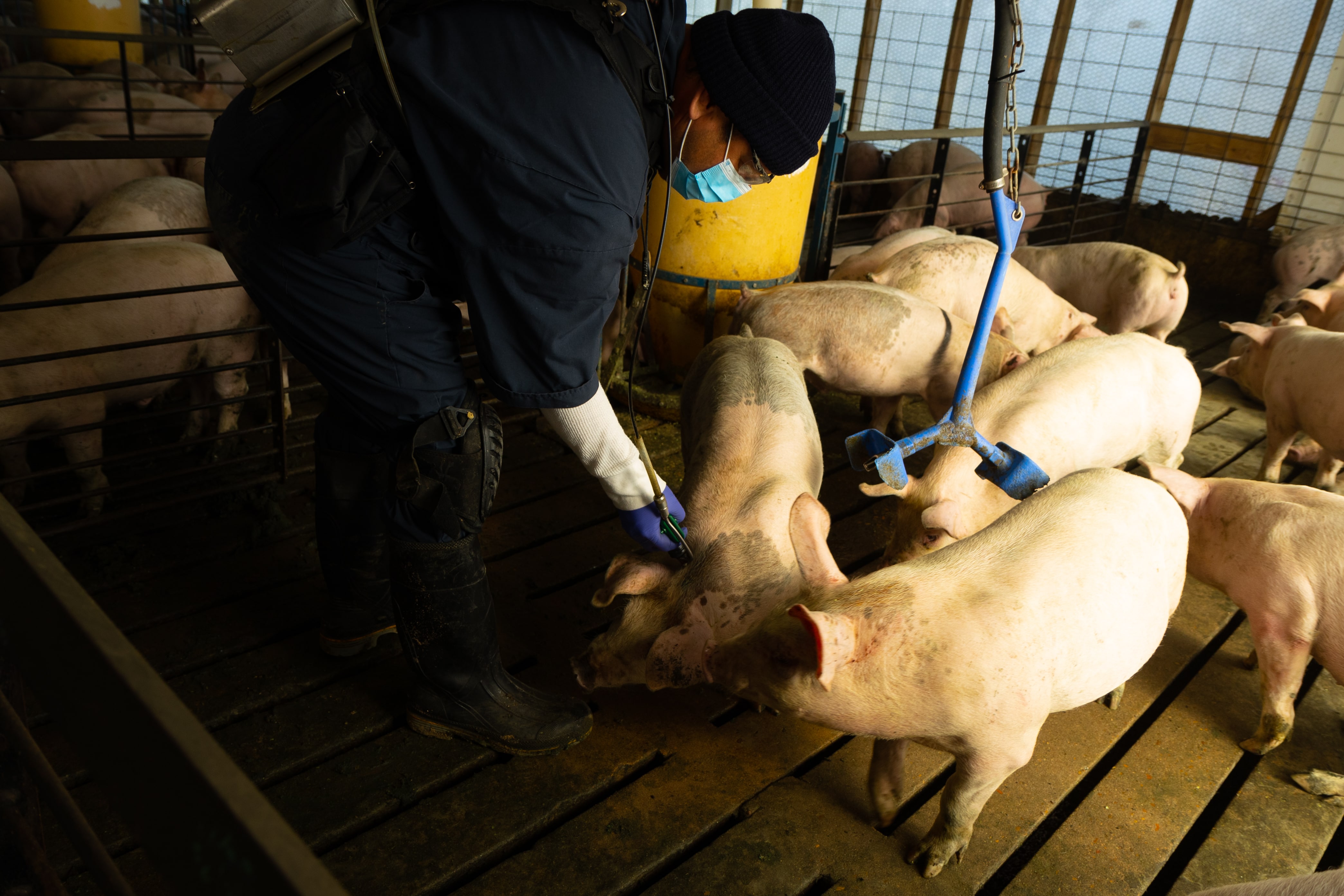Herd Health and Biosecurity: Ensuring Animal Health and Safety
Customized Nutrition
Our nutritionists take great care to develop up to 15 different proprietary grain-based diets to provide the energy, protein, fatty acids, minerals and vitamins pigs need to stay healthy and strong. Special mixes of vitamins and minerals are tailored to each stage of pig growth. These mixes help keep the pigs healthy, reducing the need for medications, while producing nutrient-rich pork with better color and texture.
Our Barns
Our barns are designed to provide our pigs with comfortable living conditions and protect them from injury and illness. The barns keep the pigs cool in the summer and warm in the winter by preventing exposure to extreme temperature swings. They receive fresh air through natural and power ventilation that helps eliminate heat, humidity and any ammonia build-up. Their manure is regularly flushed from the barns to improve air quality and reduce disease.
Disease Diagnosis and Treatment

We are dedicated to raising healthy pigs, so we can deliver wholesome pork to our families and yours. Our veterinary team, in combination with the production animal care team, use a wide range of tools and skills to monitor the health status of the pigs. Every day trained farm animal caretakers observe the animals for health and veterinarians visit the farms regularly to assess the health and condition of the animals, too.
Diagnostic monitoring and testing is conducted to ensure current health plans are appropriate and when there is a sudden change to the health status of farm sites. The veterinary team regularly consults with diagnosticians at industry-leading diagnostic laboratories to understand developing swine disease issues and new testing opportunities. The veterinary and production team also uses production records and KPI (Key Performance Indicator) charts to monitor the growth and health of the herds over time.
Biosecurity protocols, vaccination programs, animal flow management, hygiene, and antibiotics (when needed) are used in concert to develop an up-to-date and comprehensive herd health plan.
Animal Care Practices
Our practices are performed to enhance each of our pigs' daily well-being, reduce potential discomfort while improving the taste and texture of our products.
- Tail Docking - Research indicates that if tails are left intact as pigs grow, severe tail biting, a cannibalistic behavior, increases leading to injury and potential suffering. Tail docking remains an essential practice to improve long-term animal welfare and livability of growing pigs. Pig tails are docked to one-half inch at one to three days of age. The procedure includes a care taker administering pain medication to minimize discomfort and to help prevent infection. The procedure is effective and piglets quickly resume normal activiity.
- Castration - To provide consumers with the best-tasting and highest quality pork, castration is performed at one to five days of age. Research indicates pain behaviors in piglets at this young age are lessened compared to older piglets. Sharp, disinfected knives are used to make the incision during castration followed by a pain medication to reduce discomfort.
- Euthanasia - When treatment fails or the animal does not respond to care and treatment in a timely manner, trained farm employees use euthanasia to prevent animal suffering. Seaboard Foods does not allow the use of blunt force trauma to euthanize any of our animals. Pigs less than three weeks of age are euthanized using a carbon dioxide chamber. This is the preferred method for nursery pigs with captive bolt as the secondary method. All finisher pigs, sows and boars are euthanized using captive bolt that is appropriate for the animal's size.
Barn Location and Cleanliness
Different types of barns are used and located separately to help reduce disease as well as keep the pigs comfortable. We thoroughly clean and sanitize the barns after each group of pigs is moved out to prevent disease transmission. In addition, to keep our pigs healthy, our employees follow proper protocols of showering and utilizing dedicated clothing before entering and exiting the farms.
